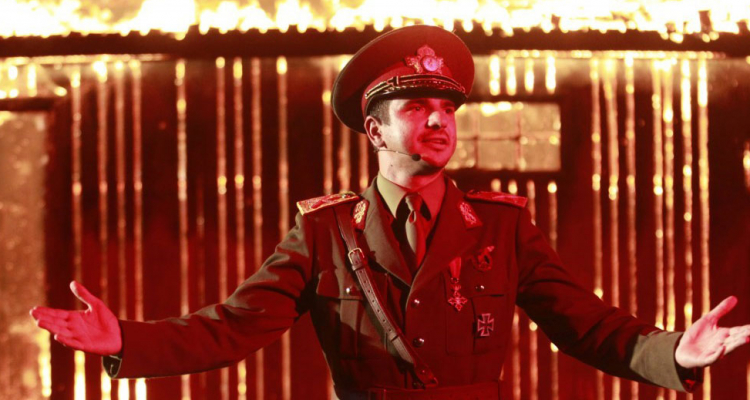KARLOVY VARY – It may be 2018, but as evidenced by the actions of elected leaders, their followers and the general public, racism and nationalism are as prevalent today as they were almost 80 years ago. That’s the subject director Radu Jude explores in his sophisticated new drama “I Do Not Care If We Go Down As Barbarians” which premiered at the 53rd Karlovy Vary International Film Festival this week. And if that title sounds like a handful, than Jude has succeeded in getting your attention.
READ MORE: A Belarus House DJ Endures For An American Visa in ‘Crystal Swan’ [Review]
The narrative structure of “Barbarians” is quite simple. Mariana (Ioana Lacob, fantastic) is a stage director working on a reenactment of atrocities waged against Romanian Jews in 1941. This was before the nation had joined the Nazi’s WWII Axis alliance. It was beforehand when authoritarian dictator Ion Antonescu ordered over a hundred thousand Jews killed in Western Ukraine, primarily the city of Odessa. The campaign against the Jewish people in Romania continued after Antonescu joined the Axis, but this specific action demonstrated how quickly the nation had turned to anti-Semitism (and fascism) like much of mainland Europe. There simply was no “the Nazi’s forced us to do it” excuse.
Working with her crew, Mariana recruits civilians whose hobbies include staging Romanian historical reenactments as well as other volunteers who fit specific roles for the project. Her piece features a Nazi guard, a Romanian military force as well as Soviet soldiers. As she starts to put the piece together she gets push back from some of the participants who outwardly complain about the gypsies brought on to play some of the roles (who knew that designation was still a thing?). The audience might be surprised by their blatant prejudice, but Mariana acts as though she expected it and provides strong pushback like any passionate director would. That’s when Movila (Alexandru Dabija, nuanced) rears his ugly head.
A local culture minister who initially pushed the city to approve Mariana’s project in front of City Hall, Movila shows up in rehearsals hoping to convince her to tone down the production. Mariana wants to depict Jewish being burned alive and hung which Movila feels won’t go over well with the politicians in power. He even has issues with the reading of Antonescu’s order for the massacre and wonders if the performance could instead focus more on condemning communist Russia (a more universally popular stance for Romanians it seems). The two wage a long, long debate about how necessary these items are to her piece with Mariana unwilling to back down even though it seems obvious she’ll eventually have to. Especially as Movila continues to return to rehearsals to pressure her again and again. Eventually the show goes on with the drama not truly about the past, but what will happen to Mariana if she goes through with her original plan and how the public will react to it.
Jude, who won the Best Director award for “Aferim!” at the 2015 Berlin Film Festival, stages his follow up in an almost Goddard-esque style. The film begins with Lacob breaking the fourth wall and talking directly to the camera as she introduces her character and pretends to cast other actors to play significant roles in the film itself. It’s very similar to what her character, Mariana, does in the film itself and it’s also a very engaging choice to bring the audience into a movie that will eventually test your patience as its characters debate the contents of the live performance.
“Barbarian” sticks with you because of the gut punch of how even after 80 years the prejudice and fears Mariana researched are still deeply rooted in some (not all) of the Romanian actors taking part in the reenactment and the audience who watch it (at one point during the live performance the assembled cheer a character disparaging Jews). Jude doesn’t need to blatantly point out how this is obvious in other parts of the world because the events in nations from the United States to Russia and back again mirror what he’s depicting on screen. The film’s title isn’t just referring to the past, but what everyone involved witnesses in their communities everyday. By letting this fester and not confronting it dead on are we not saying we’re fine with being “barbarians’? It’s a credible question the filmmaker leaves you to ponder in private.
Unfortunately, what hinders Jude’s achievement somewhat is that he allows the debate between Mariana and Movila to spin in circles for much too long. And that’s not his only miscalculation. The movie’s 2 hour and 20 min length tests the audience’s patience on numerous occasions. In one early scene, Mariana inexplicably reads a passage from a novel to her boyfriend on facetime for over five minutes with no cut in frame. It’s a strange choice for a film that, for the most part, is filled with increasingly inspired moments and a memorable heroine who won’t back down to anyone.
Grade: B+

